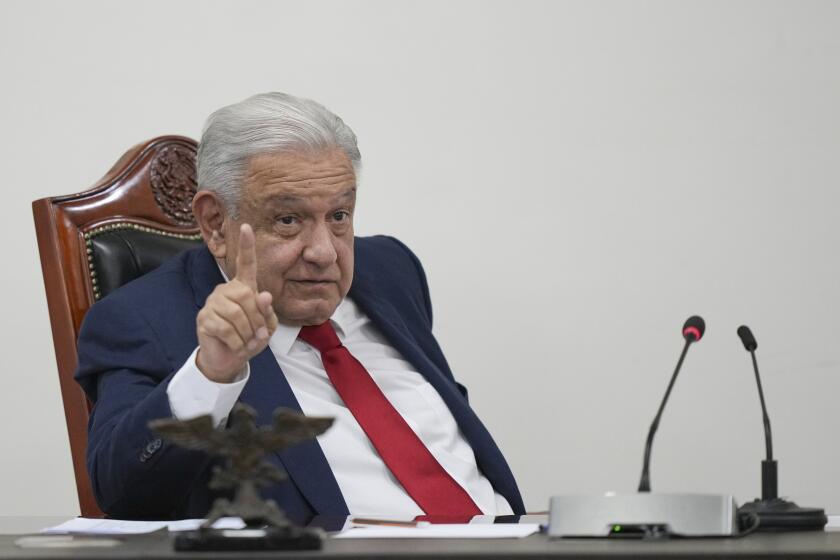Myanmar leaders agree to election rules, keep them largely secret
Myanmar’s reclusive military government has finally settled on rules that will govern long-awaited elections this year, though the measures remain largely secret.
Official news media reported Tuesday that a Union Election Commission comprising at least five people -- who must be “prominent and of good reputation” -- would be formed to oversee political parties and organize the vote.
The commission reportedly would map out electoral constituencies and have authority to close polling sites in places where “natural disasters or security reasons” could disrupt voting.
Analysts said this phrase is a likely reference to areas where armed separatists have refused to participate in the elections. The government is trying to persuade ethnic groups, some of which have been largely autonomous for decades, to disarm, transfer their militants into official border guard units and participate in the elections, but many of the larger groups continue to resist.
The elections, which the government has pledged to hold this year, are meant to shift the nation from military to civilian authority in hopes of giving Myanmar legitimacy on the international stage. The country, also known as Burma, has not known democratic rule since 1962. The most recent elections, held 20 years ago, were nullified by the military in a violent crackdown after the opposition won.
The new rules are not expected to be released in any detail until next week, and even the date of the elections has yet to be announced. United Nations Secretary-General Ban Ki-moon and others said this leaves political challengers little opportunity to mount an opposition.
“In a normal society, you would be allowed to launch a campaign by now,” said Pavin Chachavalpongpun, a researcher at the Institute of Southeast Asian Studies in Singapore. “But everything is done in secrecy. There’s no way to know what these Burmese military men have in their heads.”
Abuses under the regime, including arbitrary imprisonment and slavery, have drawn sanctions and condemnation from the United States, the European Union and other Western powers. Some scholars have characterized the fight between Myanmar soldiers and the nation’s patchwork of ethnic guerrilla groups as the world’s longest-running war.
The government reportedly holds more than 2,000 political prisoners. Nobel Peace Prize laureate Aung San Suu Kyi, who would have become prime minister after the elections nullified two decades ago, is under house arrest and explicitly barred under the constitution from holding office.
Still, the United States has put out feelers with the military leaders and suggested that some sanctions could end if Myanmar shows more tolerance for dissent. Secretary of State Hillary Rodham Clinton has said fair elections and the release of political prisoners could lead to improved relations.
“After elections, no country can keep the same old policies,” Pavin said. “The U.S. is preparing itself to cope with a new reality in Burma.”
State news media have offered a rough sketch of the country’s postelection political structure: a 440-member House of Representatives with one-quarter of the seats reserved for military leaders, and a second partially elected house made up of 168 politicians and 56 military nominees.
The closed-door approach to election planning “runs contrary to what elections are supposed to offer,” said Benjamin Zawacki, a Bangkok, Thailand-based researcher with Amnesty International. Soldiers have intensified harassment of activists from ethnic minority groups and stepped up arbitrary detention, torture and even executions, according to a recent Amnesty International report.
The military, Zawacki said, is probably trying to avoid a repetition of the quashed 1990 elections, which brought international censure.
Still, a democracy in Myanmar -- even a stage-managed version -- could legitimize the country to investors seeking a stake in its wealth of natural gas, timber and other natural resources.
The economy limps along on trade with China, Thailand, India and Russia. A recent sell-off of government property and factories to private owners, Pavin said, could signal that the leaders are more interested in controlling profitable businesses than in outright rule.
The 10-country Assn. of Southeast Asian Nations is expected to accept the election results, Pavin said, although the European Union and the U.S. could dismiss the polling as illegitimate.
“No matter what, the Burmese military won’t care,” he added. “When you have total authority, you don’t have to care.”
Winn is a special correspondent.
More to Read
Sign up for Essential California
The most important California stories and recommendations in your inbox every morning.
You may occasionally receive promotional content from the Los Angeles Times.










